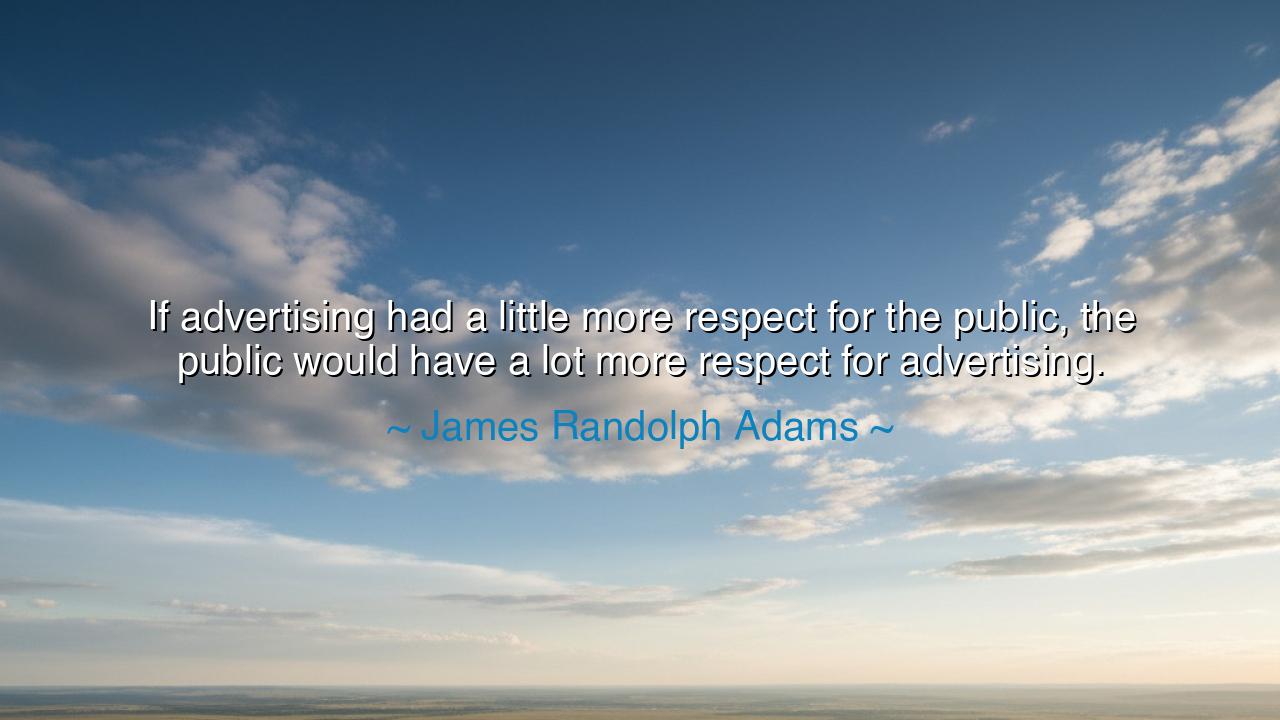
If advertising had a little more respect for the public, the
If advertising had a little more respect for the public, the public would have a lot more respect for advertising.






“If advertising had a little more respect for the public, the public would have a lot more respect for advertising.” Thus spoke James Randolph Adams, a man who understood that communication is not a game of manipulation, but a covenant of trust between the speaker and the listener. His words, though simple, carry the weight of moral truth — a truth that transcends the marketplace and touches the very fabric of human exchange. For what Adams declared about advertising is but a reflection of a greater law: that respect must flow both ways, or else both giver and receiver are diminished.
To respect the public is to recognize its intelligence, its discernment, its human dignity. The advertiser, the leader, the artist — all are messengers, speaking not to crowds of empty vessels, but to souls capable of thought and feeling. Yet too often, the messenger forgets this sacred balance. The tongue of persuasion becomes the tool of deception. Words meant to inspire become weapons to manipulate. And so, the people, once open-hearted, grow cynical and cold. Adams saw this — he saw that the public’s loss of faith in advertising was not born from ingratitude, but from betrayal. For when the powerful speak without honesty, the people listen without trust.
In the old world, there were heralds who stood before kings and citizens alike, proclaiming decrees or telling of new wonders. Their duty was not to dazzle with lies, but to deliver truth with beauty. The greatest among them were those who respected their audience, knowing that credibility was the true currency of persuasion. One might recall Marcus Tullius Cicero, whose eloquence swayed the Senate not through trickery, but through reason bound with passion. He understood that words, when wielded with integrity, could build nations. But words without honor — like corrupted advertising — could destroy them.
James Randolph Adams lived in a century when the voice of commerce grew louder than ever before. The radio spoke, the newspaper glowed, and later the television sang its siren songs to millions. But amid this chorus of promises, Adams reminded his world of a timeless virtue: truthfulness. He believed that advertising, when done with sincerity, could uplift both seller and buyer. It could illuminate the worth of things, connect creators to their audiences, and even serve beauty. But without respect — without honesty — it became hollow noise, eroding the very trust upon which civilization depends.
Let us recall the story of David Ogilvy, often called the father of modern advertising, who echoed Adams’s spirit. Ogilvy once said, “The consumer isn’t a moron, she’s your wife.” In this simple statement, he restored human dignity to the faceless “market.” He understood that effective persuasion begins not with arrogance, but with empathy. Campaigns built on respect — on intelligence, truth, and understanding — endure. Those built on deceit may glitter for a moment, but they crumble like sand. In this, we see Adams’s wisdom proven again: when advertising honors its audience, the audience, in turn, honors advertising.
And so, the quote transcends its field. It speaks not only to merchants and marketers, but to all who wish to be heard — the teacher, the artist, the politician, the parent. Respect begets respect. Speak with honesty, and you will be believed. Listen with humility, and you will be heard. The relationship between the speaker and the public mirrors all human bonds: without sincerity, there is no trust; without trust, no lasting influence.
Thus, my children, remember this: whether you sell an idea, a product, or a dream, do so with reverence for those who receive it. Do not speak down to the people — speak across to them. Let your words carry truth, for truth is the seed of respect, and respect is the soil in which loyalty grows. Those who trade in deceit reap only scorn, but those who honor the mind and heart of others reap friendship, faith, and enduring legacy.
In this way, James Randolph Adams taught not merely a rule for advertising, but a rule for life. Treat every listener as a thinking being, every audience as a gathering of souls, and every message as a chance to build trust rather than take advantage. For in the end, the strength of any voice — in business, in art, or in love — lies not in how loudly it shouts, but in how truthfully it speaks.






AAdministratorAdministrator
Welcome, honored guests. Please leave a comment, we will respond soon